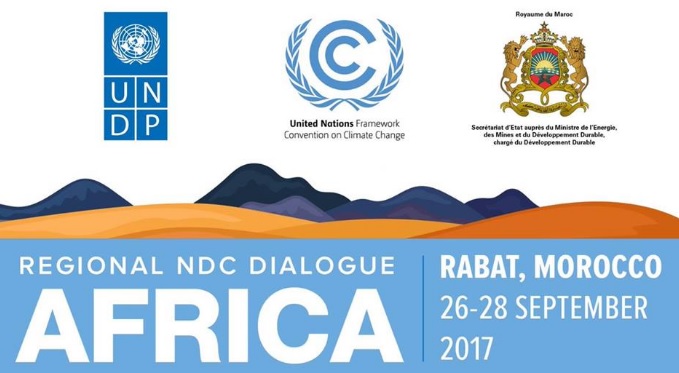SDG.IISD.org
STORY HIGHLIGHTS
A Regional Dialogue on NDCs for Africa considered ways to enhance implementation, identify challenges and opportunities and build capacity.
Participants engaged in discussions on many topics, including on practical entry points for engagement and strategies for effective private sector involvement in NDC implementation.
They discussed how local and regional planning approaches can ensure local ownership and lasting results of the policies and measures put in place.
28 September 2017: A Regional Dialogue on Nationally Determined Contributions (NDCs) for Africa aiming to support countries as they move towards the implementation stage of their NDCs explored topics related to NDC implementation. These included: experiences, best practices, opportunities and challenges in the region; capacity building gaps and needs; climate finance needs and strengthening the role of the private sector; local authority-level policies, actions and initiatives; and entry points to integrate gender equality and women’s empowerment into NDC implementation and planning.
Convening over three days from 26-28 September 2017, in Rabat, Morocco, the Regional Dialogue on NDCs for Africa was part of the fourth round of regional NDC dialogues. It brought together representatives from 50 African countries, international organizations and technical experts.
Participants considered, among other issues: key provisions of the Paris Agreement relating to NDCs; relevant outcomes of the 22nd session of the Conference of the Parties (COP 22) to the UNFCCC; planning for the 2018 Facilitative Dialogue; and an overview of submitted Intended NDCs (INDCs) and initial NDCs, including trends from the African continent. Discussions addressed: country priorities for implementing NDCs; capacity building gaps and needs experienced by African countries in NDC implementation; and tools to improve transparency and comparability between alternative mitigation actions to implement NDCs.
Deliberations on climate finance and transparency addressed practical entry points for engagement and strategies for effective private sector involvement in NDC implementation.
Participants also considered ways to appropriately reflect the interests, concerns and priorities of local authorities, including how coordination and communication across government and non-governmental agencies can be improved. Deliberations on climate finance and transparency covered issues including: developing funding strategies to consider opportunities for mobilizing resources from national budgets and planned investments; practical entry points for engagement and strategies for effective private sector involvement in NDC implementation; the Paris Agreement’s enhanced transparency framework; and country-level experiences with measurement, reporting and verification (MRV) systems.
Representatives from the Governments of Morocco and Kenya, the UN Development Programme (UNDP), the International Union for Conservation of Nature (IUCN) and the Green Climate Fund (GCF) spoke about tools and approaches to integrate gender considerations into NDCs and national climate policies. [Regional Dialogue on NDCs for Africa Webpage] [Meeting Agenda]








